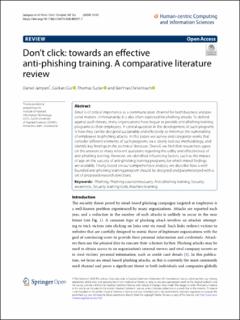Bitte benutzen Sie diese Kennung, um auf die Ressource zu verweisen:
https://doi.org/10.21256/zhaw-20346| Publikationstyp: | Beitrag in wissenschaftlicher Zeitschrift |
| Art der Begutachtung: | Peer review (Publikation) |
| Titel: | Don’t click : towards an effective anti-phishing training. A comparative literature review |
| Autor/-in: | Jampen, Daniel Gür, Gürkan Sutter, Thomas Tellenbach, Bernhard |
| et. al: | No |
| DOI: | 10.1186/s13673-020-00237-7 10.21256/zhaw-20346 |
| Erschienen in: | Human-centric Computing and Information Sciences |
| Band(Heft): | 10 |
| Heft: | 33 |
| Erscheinungsdatum: | 9-Aug-2020 |
| Verlag / Hrsg. Institution: | Springer |
| ISSN: | 2192-1962 |
| Sprache: | Englisch |
| Schlagwörter: | Phishing; Phishing countermeasure; Anti-phishing training; Security awareness; Security training tool; Machine learning |
| Fachgebiet (DDC): | 658.4: Leitendes Management |
| Zusammenfassung: | Email is of critical importance as a communication channel for both business and personal matters. Unfortunately, it is also often exploited for phishing attacks. To defend against such threats, many organizations have begun to provide anti-phishing training programs to their employees. A central question in the development of such programs is how they can be designed sustainably and effectively to minimize the vulnerability of employees to phishing attacks. In this paper, we survey and categorize works that consider different elements of such programs via a clearly laid-out methodology, and identify key findings in the technical literature. Overall, we find that researchers agree on the answers to many relevant questions regarding the utility and effectiveness of anti-phishing training. However, we identified influencing factors, such as the impact of age on the success of anti-phishing training programs, for which mixed findings are available. Finally, based on our comprehensive analysis, we describe how a well-founded anti-phishing training program should be designed and parameterized with a set of proposed research directions. |
| URI: | https://digitalcollection.zhaw.ch/handle/11475/20346 |
| Volltext Version: | Publizierte Version |
| Lizenz (gemäss Verlagsvertrag): | CC BY 4.0: Namensnennung 4.0 International |
| Departement: | School of Engineering |
| Organisationseinheit: | Institut für Informatik (InIT) |
| Publiziert im Rahmen des ZHAW-Projekts: | OptiPhish – Effective and Measurable Phishing Awareness Training |
| Enthalten in den Sammlungen: | Publikationen School of Engineering |
Dateien zu dieser Ressource:
| Datei | Beschreibung | Größe | Format | |
|---|---|---|---|---|
| 2020_Jampen-etal_Effective-anti-phishing-training-literature-review.pdf | 2.93 MB | Adobe PDF |  Öffnen/Anzeigen |
Zur Langanzeige
Jampen, D., Gür, G., Sutter, T., & Tellenbach, B. (2020). Don’t click : towards an effective anti-phishing training. A comparative literature review. Human-Centric Computing and Information Sciences, 10(33). https://doi.org/10.1186/s13673-020-00237-7
Jampen, D. et al. (2020) ‘Don’t click : towards an effective anti-phishing training. A comparative literature review’, Human-centric Computing and Information Sciences, 10(33). Available at: https://doi.org/10.1186/s13673-020-00237-7.
D. Jampen, G. Gür, T. Sutter, and B. Tellenbach, “Don’t click : towards an effective anti-phishing training. A comparative literature review,” Human-centric Computing and Information Sciences, vol. 10, no. 33, Aug. 2020, doi: 10.1186/s13673-020-00237-7.
JAMPEN, Daniel, Gürkan GÜR, Thomas SUTTER und Bernhard TELLENBACH, 2020. Don’t click : towards an effective anti-phishing training. A comparative literature review. Human-centric Computing and Information Sciences. 9 August 2020. Bd. 10, Nr. 33. DOI 10.1186/s13673-020-00237-7
Jampen, Daniel, Gürkan Gür, Thomas Sutter, and Bernhard Tellenbach. 2020. “Don’t Click : Towards an Effective Anti-Phishing Training. A Comparative Literature Review.” Human-Centric Computing and Information Sciences 10 (33). https://doi.org/10.1186/s13673-020-00237-7.
Jampen, Daniel, et al. “Don’t Click : Towards an Effective Anti-Phishing Training. A Comparative Literature Review.” Human-Centric Computing and Information Sciences, vol. 10, no. 33, Aug. 2020, https://doi.org/10.1186/s13673-020-00237-7.
Alle Ressourcen in diesem Repository sind urheberrechtlich geschützt, soweit nicht anderweitig angezeigt.